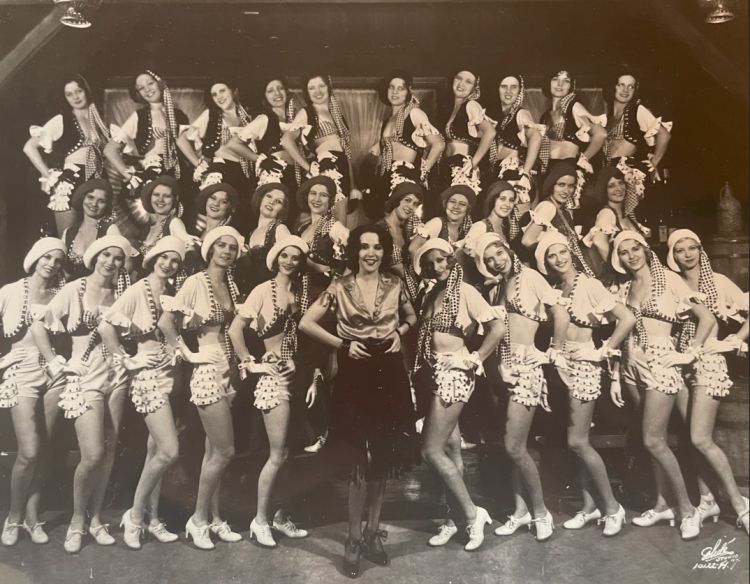Music Public Lecture: I Got Rhythm, I Got (Some) Music' - Reconstructing Musicals as Critical Editions

- Date: Wednesday 30 April 2025, 17:00 – 19:00
- Location: Clothworkers Centenary Concert Hall, Music
- Cost: Free
Ian Sapiro (School of Music, University of Leeds) will present a public lecture entitled 'I Got Rhythm, I Got (Some) Music: Reconstructing Musicals as Critical Editions'
Location: Clothworkers Centenary Concert Hall
Please note, this event will begin with a related student performance-lecture at 4.30pm. Ian Sapiro's lecture will begin at 5pm following a short break. The Clothworkers bar in the School of Music foyer will be open for this event.
Abstract:
This lecture draws on my research into the archival resources for musicals undertaken through my 2024 Annegret Fauser and Tim Carter Fellowship at the Library of Congress Music Division, and supported by research leave awarded by the School of Music and the Faculty of Arts, Humanities and Cultures at the University of Leeds.
Musicals and their forebears are often indelibly associated with their composers or composer-lyricist partnerships, from Gilbert and Sullivan’s The Pirates of Penzance to Lin-Manuel Miranda’s Hamilton. However, attributing authorship like this over-simplifies the relationship between a musical-theatre work and the multiple ‘authors’ responsible for its creation. Archival sources for a show’s musical score often comprise just a single verse and chorus of each (though not necessarily every) song in the composer’s hand(writing), with blank spaces left for introductions and codas, and few (if any) indications of singers, lyrics or instrumentation. Similarly, while incidental music such as dance breaks and scene changes will be based on the composer’s material, they were (and, indeed, still are) normally created by an orchestrator or dance arranger, and would never have existed in the composer’s hand nor necessarily have been prepared under the composer’s guidance. Accordingly, where musicals are concerned, the notion that the composer (or composer-lyricist partnership) might be the sole authority, let alone author, is extremely misleading.
Musicals evolve through a process of continuous development that may extend even beyond the premiere, and changes are an expected outcome of workshops, rehearsals, and try-outs (public performances ‘out of town’ before the official Broadway or London opening). They can even occur during previews, and in all cases may be due to input from a range of stakeholders rather than being limited to decisions taken by the composer. These collaborative and iterative practices have significant implications for the reconstruction of musicals as critical editions, since, in contrast to historical concert pieces, musical-theatre works lack a single point of origin/authorship and effectively linear writing process. This lecture, and my Fellowship project, focuses on the specific challenges faced by critical editors when reconstructing musicals, using my work creating a critical performing edition of the musical Girl Crazy (1930), for the George and Ira Gershwin Critical Performing Edition project, as a case study.
Speaker bio:
Dr Ian Sapiro is an Associate Professor of Music for Stage and Screen at the University of Leeds, where he is also Deputy Pro-Dean for Student Education in the Faculty of Arts, Humanities and Cultures. His research focuses on film music, musical theatre, orchestration, adaptation, production processes, and the overlaps between them. He has published on topics including Ilan Eshkeri’s score for Stardust, the music of John Williams, and the screen adaptations of Les Misérables and Annie, and book chapters on aspects of music and sound in Sister Act, Frozen II, and Emmerdale will all be published in the next year. Ian is currently working on a new critical performing edition of the 1930 George and Ira Gershwin musical Girl Crazy, as part of the international project, ‘The George and Ira Gershwin Critical Edition’. He is the holder of the inaugural Annegret Fauser and Tim Carter Fellowship at the Library of Congress Music Division, for which he is exploring the challenges of creating a critical performing edition of a musical-theatre work.
Ian has been a professional conductor of amateur musical theatre for over 25 years, working as musical director for over 50 productions in that time. He spent fifteen years with Buttershaw St Paul’s AODS (Bradford) and Bradford Youth Players, and has also worked with groups in Leeds, Halifax, Dewsbury and on the Wirral. He is currently musical director for Bingley Little Theatre and Guiseley Theatrical Productions, with whom he will next be performing Betty Blue Eyes (May 2025) and 9-to-5 (October 2025) respectively. Ian has won awards for musical direction, and in 2017 received the rare and prestigious National Operatic and Dramatic Association (NODA) Commendation, a medal recognising the work of a non-amateur who has given devoted service to amateur theatre over a period of at least ten years.
This will be a hybrid event. The guest speaker will be present with us in the School of Music, and colleagues and other guests are encouraged to join us there. But if you are unable to do so then please consider joining us via Zoom.
Visit EventBrite to reserve your ticket(s).
Main image: Ethel Merman with the chorus of Girl Crazy (Credit: PBS).

